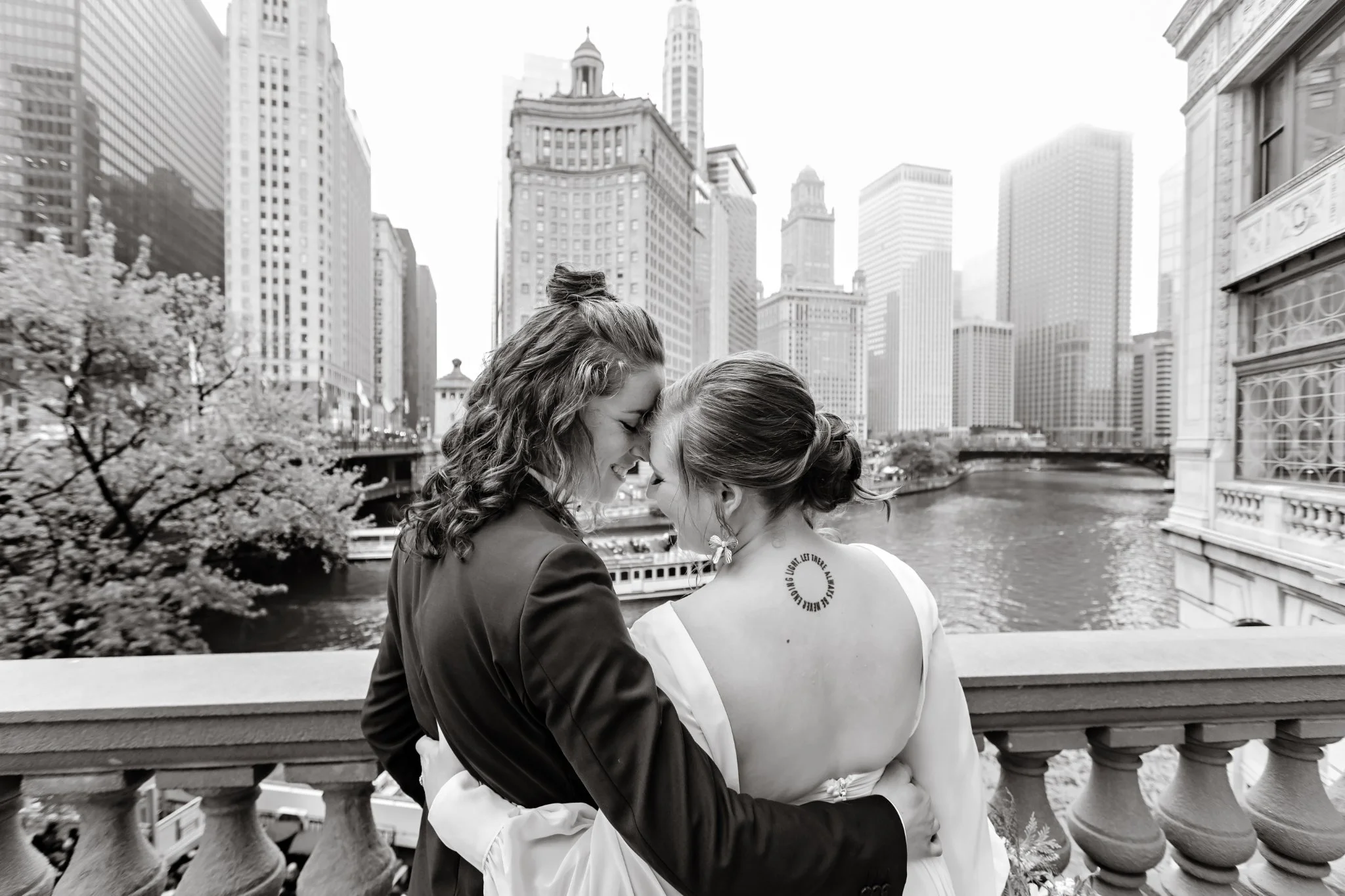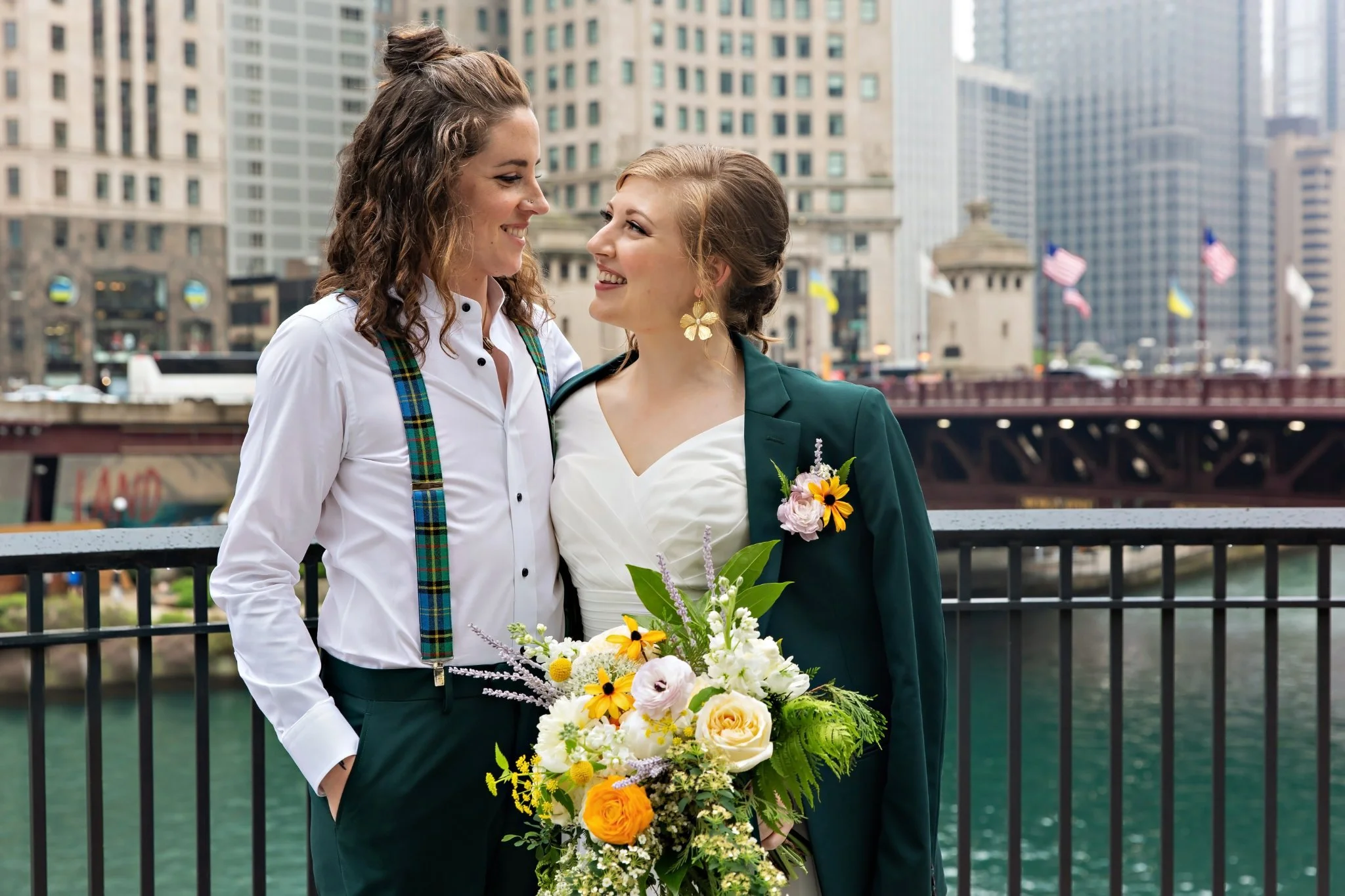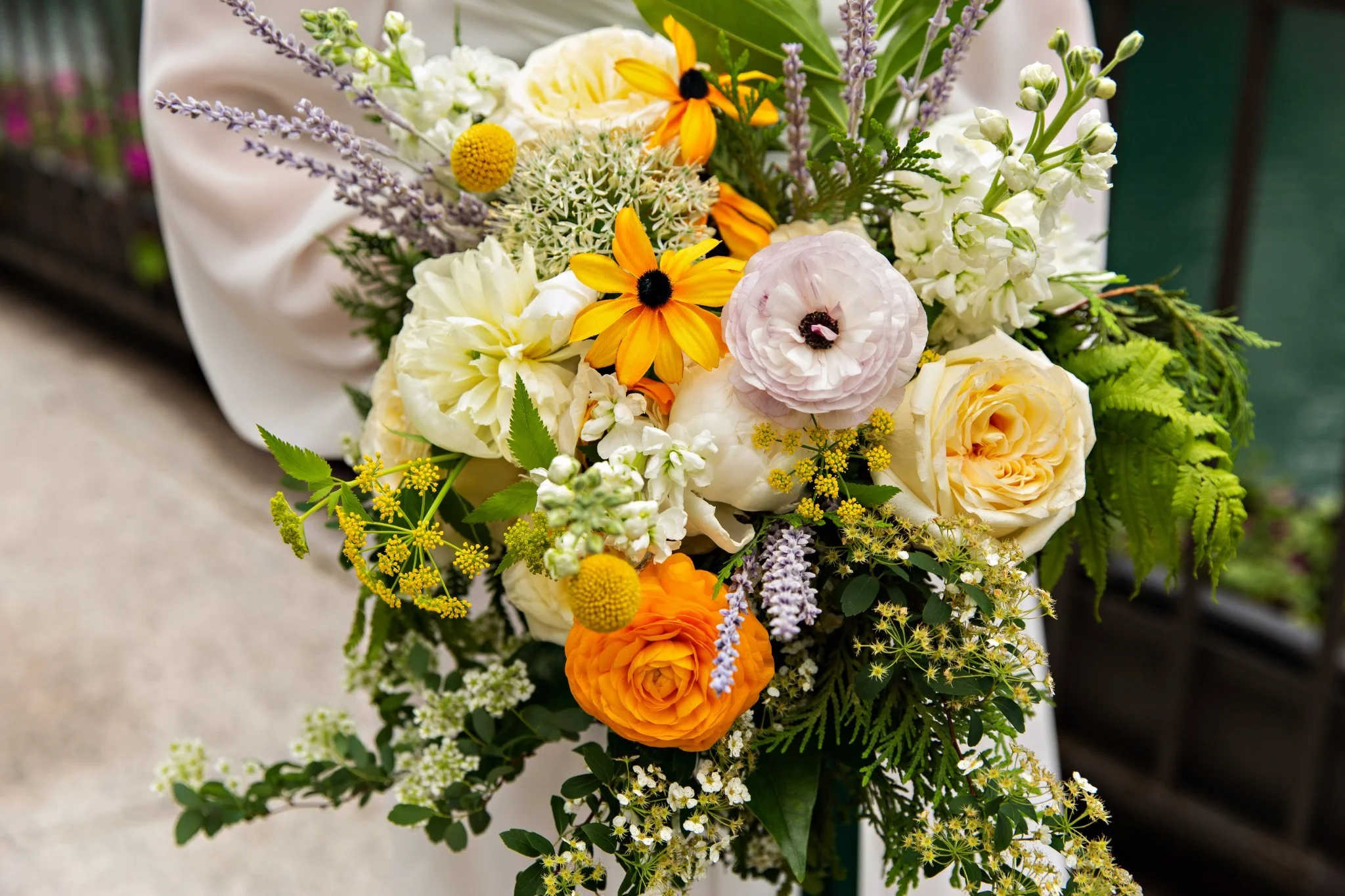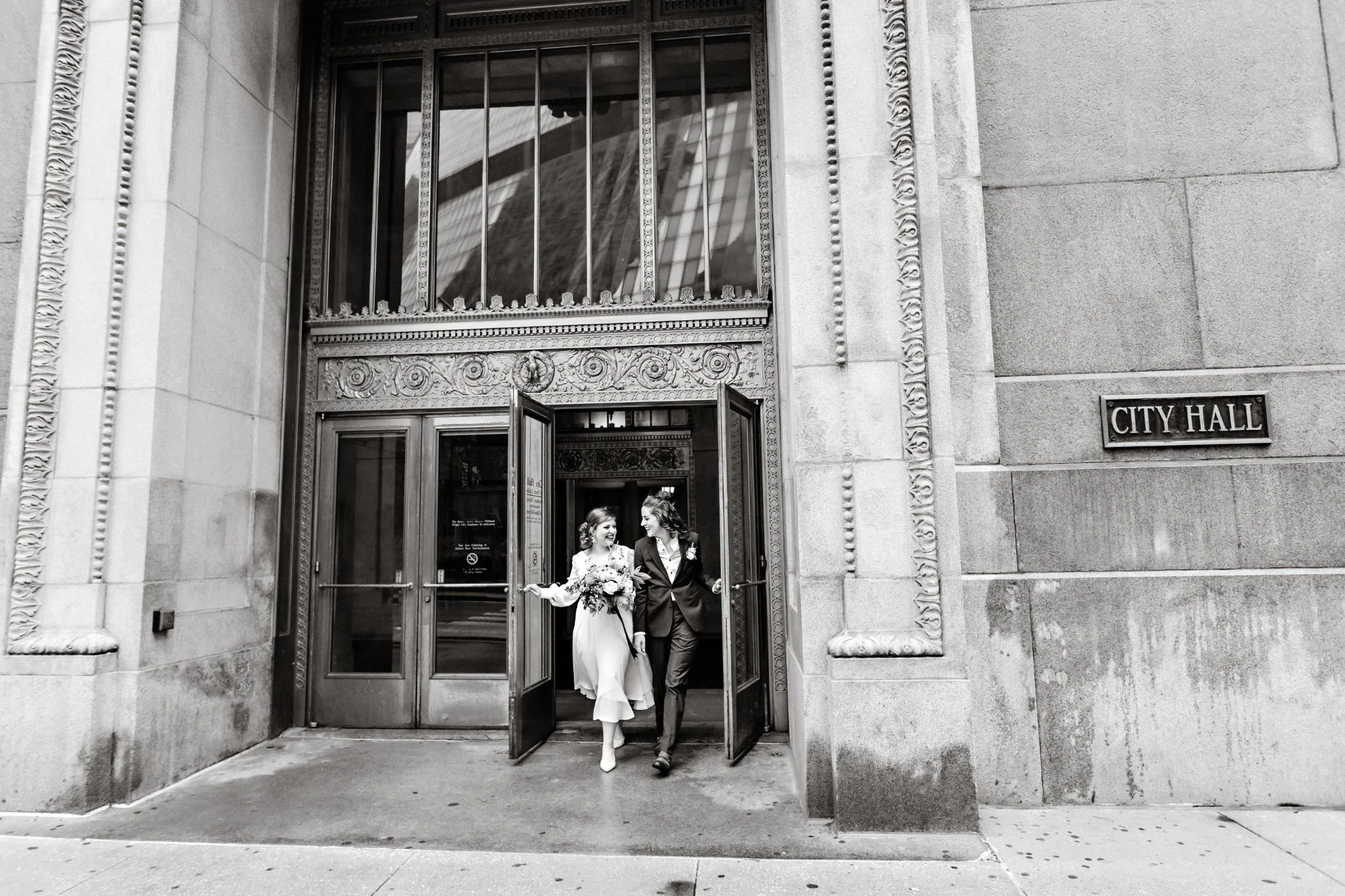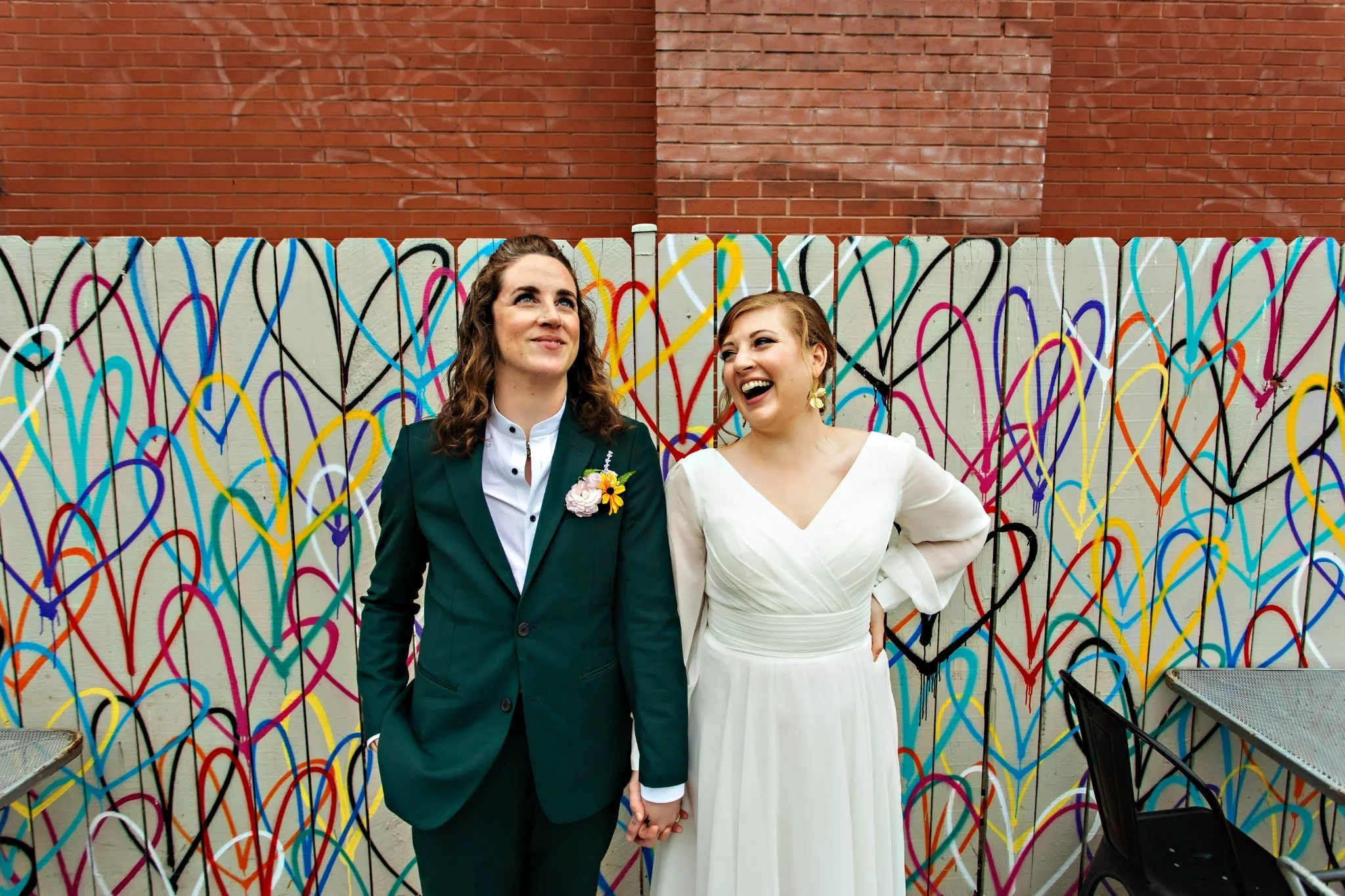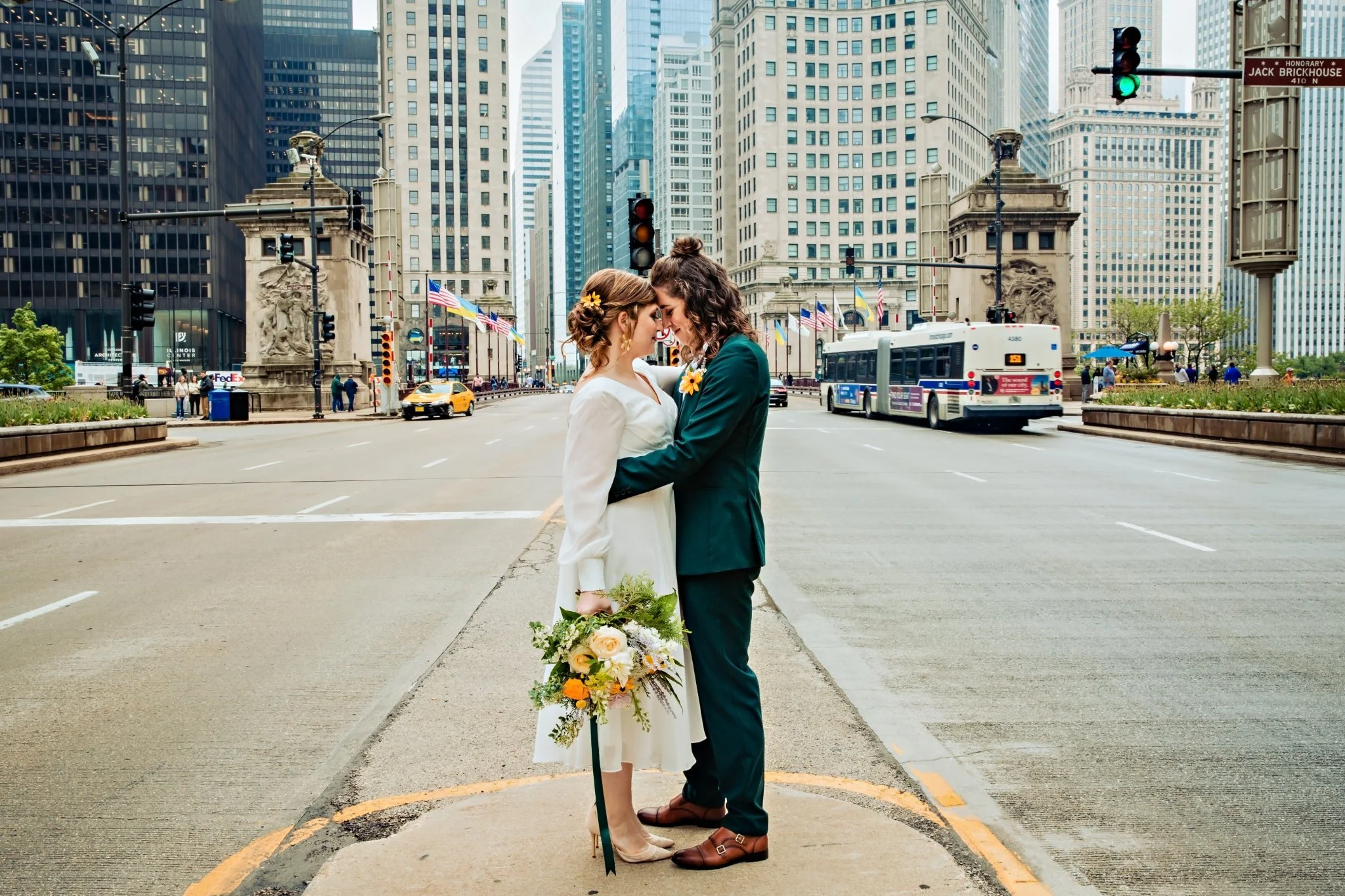How to Plan a Wedding After the Death of a Loved One: Ideas for Honoring Grief and Loss on Your Wedding Day
Grief can make reading hard. Want to listen to this article instead? Find its corresponding podcast episode here.
Disclaimer: I’m a nonreligious American grief coach, so while this article is grounded in personal experience and professional insight, it may not include key elements of your cultural or spiritual traditions. Take what serves you, add your own spin, and invent new traditions where needed.
Introduction: The Bittersweet Weight of Your Wedding Day
There’s a very specific sort of ache that accompanies a wedding planned after a loss.
It’s a sort of joy and dread tangled together in your chest, clashing and competing against each other in a way that doesn’t make sense to anyone who hasn’t been through it. It’s the happy anticipation of the future tugged on sharply by the longing for someone who only exists in your past. A wedding—and the lead-up to it—is one of those occasions where it seems like everything is happening all at once: the present moment, the people and memories that brought you to this place, and the path laid out before you and your partner going forward.
You may have imagined your wedding since childhood—before you even knew who your partner would be—or you might be a person who assumed you’d never get married. Regardless of which is true, you knew from the moment your loved one died that a joyful milestone day like this would come. And they wouldn’t be here to celebrate it with you.
When my mom died in 2013, I was 21 years old. I was dating someone I intended to marry, and one of the first thoughts I had after her death was, “She won’t be at my wedding.” I’ve heard similar stories from my clients and students after the deaths of their parents, grandparents, siblings, children, friends, and pets. There is a heartache in knowing—with devastating certainty—that someone you love won’t be with you on one of the most significant days of your life.
When I married my wife, Heather, in 2022, we were missing nine beloved people between us. Every part of the day was interwoven by grief. We chose carefully what kind of wedding we wanted—not just for aesthetics, but for emotional survival. This article is based on our experience and the experiences other grieving people have shared with me.
Please know that these guided questions and suggestions about planning a wedding while grieving are not about choosing joy instead of pain. It’s about creating space for both—intentionally making room for the foundations of love in your past as you expand and build upon those foundations of love in the future.
Heather and I on our wedding day | Photo: Elope to Chicago
Structure and Format: Choosing the Right Type of Wedding for Your Grieving Heart
You don’t have to do what everyone else is doing.
A wedding that includes your grief invites you to pause and consider:
How much energy do I realistically have to spend?
Grief takes from your reserves in ways most people can’t see. Even joyful planning can be emotionally exhausting (Hello, logistics, numbers, dates, and timelines!). A smaller wedding or elopement may offer more peace of mind and allow you to be more present with your partner. If you’re looking for inspiration, try searching “micro wedding” on Google or Pinterest.
What kind of emotional space do I need?
Do you want quiet intimacy or a communal celebration? Will a party energize or exhaust you? Can you elope now and host a celebration later? Unless your culture or religion dictates a specific wedding timeline, feel free to get creative with the timing of your wedding. This could look like having a small church wedding now and an all-out party at the same time next year. (My sister did this during COVID). Or it could look like scheduling “breathers” into the day—moments of space where you can be by yourself or alone with your partner between makeup, photos, ceremony, reception, and rounds on the dance floor.
Who do I want by my side?
When you grieve, your tolerance for surface-level relationships often plummets. Choose people who understand the fullness of your heart—including the parts that may still feel broken on your wedding day. This goes for your wedding party and guest list but it also applies to service professionals too.
For my wife and I, having a grief-friendly photographer took so much pressure off us when it came time to take two hours’ worth of photos. Simply reaching out to a service provider with, “I’m going to be grieving my [parent/child/friend/pet] on my wedding day; how can you help me honor that emotional experience?” can open doors for all kinds of options you may not have considered. Your caterer might offer to make a dessert inspired by your grandma’s peach cobbler, your DJ could suggest a end-of-the-night sendoff song that honors your brother, or your tailor could suggest a suit with extra pockets for tissues and your best friend’s antique pocket watch.
Where do I want to be?
Choose a location that feels emotionally safe. That could mean marrying in your backyard under the tree where your loved one always sat, or somewhere far away that doesn’t hold any memories you don’t want to carry. As you consider venues, ask yourself how long it will take to get there, how you feel inside of it, and whether it has the space you need not only for you and your guests, but also for your grief.
What time would feel best?
Consider what season you’d like to get married in—not just for the venue or the type of flowers available, but also for how you carry your grief. If the winter holidays are hard, you might choose May over December. If Father’s Day is difficult, perhaps September would be a better fit that June.
You might expand this idea and consider marrying on a loved one’s birthday or anniversary so you have a shared celebration date in common. Heather and I chose to get married on May 25 (or “525”) because palindromes remind us of our parents. (“Mom” and “Dad” are both palindromes—spelled the same backwards as forwards.) We also got married at 9:15 in the morning, when our energies were the highest. After taking photos, having a taco lunch, and getting wedding tattoos, we were both down for a nap at our hotel by 3:00pm. It was heavenly to be able to get married and then have a nice long rest before dressing up for dinner.
Heather wore her dad’s tartan suspenders in memory of him. | Photo: Elope to Chicago
Clothing: Infusing Meaning and Memory Into What You Wear
Your clothing doesn’t have to scream grief, but it can whisper remembrance.
Here’s some things you might consider when it comes to what you wear on your wedding day:
Can I repurpose what I already love?
Maybe you wear your late father’s cufflinks. Maybe your dress is reimagined from your mother’s or grandmother’s. Maybe you sew the tag from your pet’s collar or a swatch of your child’s favorite pair of overalls into your suit jacket. When it comes to clothing, meaning can be stitched directly into your fabric. Initials, flowers, flags, symbols, and handwriting can all be embroidered onto all kinds of fabrics—including dresses, suits, hats, veils, pocket squares, and sometimes even shoes.
Heather chose to wear her dad’s tartan suspenders for our wedding. We did a few photos with her suit jacket off and it was heart-filling to see her dad’s presence on full display. And if you don’t want to alter the clothing you’re wearing, perhaps a display of your loved one’s clothes is appropriate, a sort of “in memoriam fashion show.” I recently came across an Instagram Reel where a couple displayed their mothers’ respective bridal gowns at a special table during cocktail hour.
Can I add touches that carry them?
Jewelry, hairstyles, watches, shoes, glasses—even perfume—can evoke the essence of someone who’s no longer here. These subtle details can become an unspoken, portable altar you literally carry with you throughout the day.
Both my engagement ring and wedding ring contained diamonds from our moms. And Heather’s wedding band is her mom’s wedding band, with a nice fresh polish on it! Shoutout to Adornment + Theory in Chicago for bringing our heirloom jewelry dreams to life.
Our wedding flowers, including some that reminded us of our loved ones | Photo: Elope to Chicago
Flowers: Selecting Blooms with Intention
Flowers can tell the story of who’s missing—and how much they mattered.
As a freelance florist (I have many hobbies) there are a few questions I encourage couples to ask when choosing wedding flowers:
Are there any flowers that are significant to you?
You might select flowers your person loved, or that remind you of them. Every stem can be a thread of connection. And even if your florist can’t get in a specific flower because of the time of year, cost, availability, or durability, you can always explore dried or artificial flowers.
For my wedding I wanted my favorite flowers, black-eyed Susans and Heather really wanted lavender. Neither was in season in May in Chicago. I ordered artificial ones online and folded them into real peonies, roses, spirea, ranunculus, and stock. No one was the wiser and it felt like both of us were represented in the flowers.
Can I attach photos or tokens to my flowers?
Tiny lockets, charms, or ribbons with initials can be woven into bouquets or boutonnieres. Especially if you’re walking down the aisle, it can feel special to gently touch the charm on your bouquet or the locket tucked into the pocket over your heart.
Do I want to stick to a special color scheme?
Maybe purple was your sister’s favorite color. Maybe your grandfather always gave you yellow roses. If it feels right, let that guide your palette. In the U.S., sympathy flowers and wedding flowers are generally the same color: white. A simple, classic all-white palette could do double-duty on a joyful/grief-ful day.
We were married at City Hall in Chicago, and the judge who married us took great care to use words that resonated for us both. | Photo: Elope to Chicago
Readings: Speaking Words That Honor Both Grief and Joy
Whether you're religious, spiritual, or completely secular, readings can help capture the emotional complexity of the day.
Take an inventory of who is going to be speaking (including you!) on your wedding day. And then ask yourself the following:
Can I incorporate popular poetry or literature?
Many poets and authors have written books that reflect themes of memory, grief, or enduring love. Consider work by Mary Oliver, Pablo Neruda, Rainer Maria Rilke, or Ocean Vuong.
Would I like to read a letter or journal entry written by the person I’m missing?
Love letters, stories, and jokes are almost always appropriate to read at weddings. If you’re not able to read a loved one’s words, you might enlist a friend or family member to read them as a part of your ceremony. You might also incorporate them into your vows.
Are there religious or spiritual texts that resonate with me?
While they’re not comforting for everyone, words from a higher power—if they’re comforting to you—can feel like an anchor on a griefy day. Even if you aren’t religious, a verse or blessing from your loved one’s tradition can feel grounding.
Would I like to write a custom reading?
If you have an officiant or a master of ceremonies, supplying them with space-setting statements can be a helpful way to honor not only your grief, but the griefs of other friends and family members in the room.
This could include lines like:
“A warm welcome to everyone who loves this couple, including those who’ve passed on.”
“There are some who cannot be here today, and the couple carries their love with them into their marriage.”
“We honor everyone—living and gone—who showed the couple what it means to love.”
As a grieving person, you know that words have power. Weaving them into your special day is just one way to stabilize your heart on a day where many emotions are present.
Heather and I saw lots of signs and symbols from those we love on our wedding day.| Photo: Elope to Chicago
Rituals and Memorials: Making Space for Who’s Missing
Memorials and rituals—both static setups and action-oriented gestures—are beautiful ways to honor grief’s presence on your wedding day.
Here’s some ideas for fixed or static memorials that are set up in one place for you and your guests to appreciate:
A memorial chair with a photo, flower, or candle. Leave a note or program at the seat explaining its significance.
A memory table with framed photos, handwritten notes, candles, or objects that belonged to your person.
A slideshow or memory wall at your reception. Let guests engage with their own memories of your person.
Here are some other more action-oriented memorials that can help you feel connected to a loved one on your wedding day:
Light a candle together or invite a guest to light it during the ceremony.
Release doves or butterflies (if done ethically and responsibly) to symbolize transition, love, and continuation.
Play their favorite song during a quiet moment or dance in their honor.
Pour out a ceremonial drink (like wine, tea, or whiskey) in their memory. Let that first sip be for them.
Plant something—a tree, flowers, herbs—as part of the ceremony or reception.
Memorials and rituals are great jobs to give to trusted friends and family who offer, “Let me know if there’s anything I can do to help.” For instance, your techie cousin might be able to put a slideshow together faster than you or your partner could or your uncle might be great at sourcing a local tree to plant from a nursery. Whatever you choose to do, it’s not about what you do. It’s about your intention behind it, and how it honors your grief and your loved one.
Our photographer was great at inviting us to take moments to pause, even on camera. Can you see the “151” palindrome on the bus? | Photo: Elope to Chicago
Closing Thoughts: Your Wedding Day Is All About You, Your Partner, AND Your Grief
Planning a wedding while grieving requires a different approach to run-of-the-mill wedding planning. Grief demands space and time to pause, consider, ponder, create, and remember. That’s not a bad thing—it’s very human to grieve on your wedding day—but it does mean a little more energy and consideration from you.
As a grieving person, I can’t tell you how grateful I am to have planned a grief-honoring wedding with a partner who is also grieving. All of our loved ones “came along for the ride,” and both of us could feel it.
As you plan your wedding together, may you and your partner make loads of room for grief to “come along for the ride.” Because somehow, magically, grief shared is grief lightened.
I hope this checklist is a helpful guide and starting point for making room for your loss and your loved one on a big, milestone day.
If you’re looking for even more tips and tools for navigating life with grief, plus weekly live grief coaching from me, join my online community, Life After Loss Academy. I’ll walk you through my signature GRIEF Method framework and answer your questions about loss, honoring your loved ones, and moving forward in the way that works best for you.
